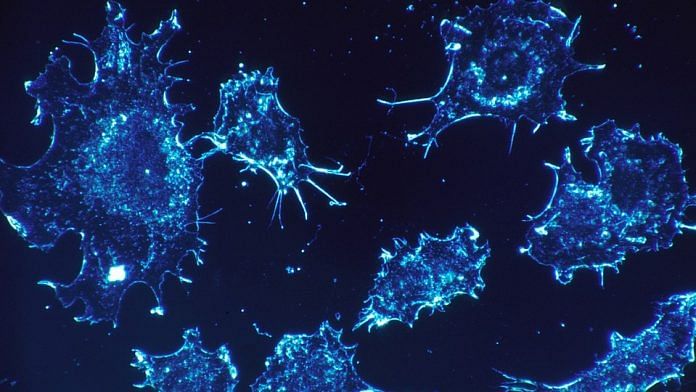
Bengaluru: It has been an excellent week in humanity’s fight against cancer — three teams of scientists from different parts of the world have made major progress in detecting and curing the disease.
A team of researchers from Glasgow, Scotland, has discovered a way to use a blood test to identify brain cancer. Another from Belfast, Northern Ireland, has devised a method to predict the future behaviour of prostate cancer.
However, the third study, conducted by a team from Queensland, Australia, could turn out to be the most significant, as it has demonstrated a cure for cervical cancer in mice using the CRISPR gene-editing technique.
Also read: Drug to replace chemotherapy may reshape cancer care
Cost-saving method of detecting brain cancer
In a paper published in Nature Communications, the Glasgow researchers have explained their new method of identifying brain cancer faster by analysing multiple blood test samples. A similar test had been developed before, but it wasn’t as affordable as the new spectroscopic method, which uses silicon wafers to reduce costs.
The research has been validated in a clinical study and proved quite effective. Of the 104 patients whose blood was drawn, the researchers’ device could identify brain cancer correctly 87 per cent of the time. Brain cancer does not present any specific symptoms that enable it to be identified, and diagnosis of the disease consumes too much time.
The new process is inexpensive and faster, and while it isn’t a complete diagnosis tool, it could enable better triage. This will assist doctors and medical professionals in early identification, expediting treatment, and saving cost.
Also read: New blood test can detect ovarian cancer up to two years faster, says study
CT scans for detecting growth of prostate cancer
In Belfast, Queen’s University researchers used images from a CT scan to analyse and identify patterns in features which could predict the progression of prostate cancer. The study was published in the International Journal of Radiation Oncology.
This means that using merely a CT scan, doctors could assess how aggressive prostate cancers are and project their growth more effectively.
Cancer of the prostate is one of the most commonly occurring cancers, but its growth varies widely from person to person. Some tumours can remain undetected for years, while some metastasise in months.
Also read: Targeted therapy can weaponise cells to kill cancer, says oncologist Siddhartha Mukherjee
Cure for all cancers?
Researchers at Griffith University in Queensland have used the gene-editing technology CRISPR to cure cervical tumours in mice completely. The study, published in the journal Molecular Therapy, was conducted over five years, and the researchers experimented with the gene E7, which is found in human papilloma virus (HPV)-related cancers.
The gene was extracted and the virus edited with external DNA so that it prevented the gene from being created. As the cancer requires this gene for sustenance, it can no longer survive and the patient is thus cured.
The researchers have clarified that the mice showed no other side effects, but they are yet to assess the genome for any other genetic changes.
The hope is that other cancers can all be treated similarly when their production genes are identified.
Also read: Chinese scientists edit DNA in attempt to cure man’s cancer, HIV

It is time to think about methods other than killing the growth. If you can convert cancer to something useful why kill the new cells? Growth cannot be to kill an organism. Growth is a sign of life and reproduction. Details in e book” Why Cancer” ISBN:9781370190973..